1 Samuel 21 meaning explained in AI Summary
This chapter details David's flight from Saul and his desperate attempts to survive.
1. David's Deception at Nob (vs. 1-9):
- David, fleeing Saul, arrives at the tabernacle in Nob and meets the priest, Ahimelech.
- Fearing for his life, David lies to Ahimelech, claiming he's on a secret mission for King Saul.
- He asks for food and a weapon, but only finds holy bread (Showbread) and the sword of Goliath, which Ahimelech gives him.
2. Refuge with Achish in Gath (vs. 10-15):
- David, realizing his deception could endanger Ahimelech, flees to Gath, the Philistine city of Goliath.
- He believes he'll be safe among his enemies, but the servants of Achish, the king of Gath, recognize him as the slayer of Goliath.
- Fearing for his life, David feigns madness, acting erratically to convince them he's harmless.
- Achish, seeing David's "madness," dismisses him as a harmless lunatic.
Key Themes:
- Survival and Deception: This chapter highlights David's desperate situation and his willingness to lie and deceive to survive.
- The Cost of Loyalty: David's deception, while saving his life, will have tragic consequences for Ahimelech and the priests of Nob later in the narrative.
- Divine Protection: Despite his desperate measures, David is still under God's protection, even finding refuge among his enemies.
Foreshadowing:
- This chapter sets the stage for David's complex relationship with the Philistines, who will become both allies and enemies in his future.
- David's acquisition of Goliath's sword foreshadows his future victories and his rise to power.
Overall, Chapter 21 is a pivotal chapter in David's story, showcasing his cunning, desperation, and the precarious nature of his situation as he flees from Saul's murderous rage.
1 Samuel 21 bible study ai commentary
David, as God's anointed yet-to-be-crowned king, enters a period of intense suffering and exile. This chapter portrays his desperation and moral compromise in the face of fear. Fleeing from Saul, David deceives the priest Ahimelech to get holy bread and Goliath's sword, an act with both immediate and tragic consequences. His subsequent flight to the enemy city of Gath forces him to feign insanity for survival. Throughout these low points of deceit and humiliation, God's providence subtly works to preserve His chosen one, highlighting the tension between human frailty and divine faithfulness.
1 Samuel 21 Context
The Tabernacle, after its destruction at Shiloh, was temporarily located at Nob, a priestly city near Jerusalem. This was the religious heart of Israel during Saul's reign. The items within, like the Bread of the Presence (showbread), were governed by strict purity laws under the Mosaic Covenant. Politically, the kingdom was fractured by Saul's intense paranoia and jealousy of David, creating a climate of fear where helping David was a capital offense. This context makes David’s actions desperate and Ahimelech's fear entirely rational.
1 Samuel 21:1
Then David came to Nob, to Ahimelech the priest. And Ahimelech came to meet David, trembling, and said to him, “Why are you alone, and no one with you?”
In-depth-analysis
- David flees to Nob, the city of priests, seeking sanctuary and aid at the religious center of Israel.
- Alone: Ahimelech immediately recognizes that something is wrong. A commander of David’s stature traveling without an entourage is a clear red flag.
- Trembling: The Hebrew word is charad, signifying deep fear and terror. Ahimelech’s reaction shows the pervasiveness of Saul's wrath. He is not trembling at David, but at the implications of David’s suspicious arrival. He knows sheltering a potential enemy of the king is a death sentence.
Bible references
- 1 Sam 22:9-10: 'Then Doeg the Edomite... said, “I saw the son of Jesse coming to Nob, to Ahimelech...”' (The tragic result of this meeting).
- 1 Sam 16:4: 'And the elders of the town came to meet him trembling and said, “Do you come peaceably?”' (Similar fear shown by elders at the arrival of God's representative, Samuel).
- Psa 52 (title): 'A Maskil of David, when Doeg the Edomite came and told Saul, "David has come to the house of Ahimelech."' (Directly links this event to Psalm 52's condemnation of Doeg).
Cross references
1 Sam 14:3 (Ahimelech's lineage), Hos 3:4 (Israel without king or priest).
1 Samuel 21:2-3
And David said to Ahimelech the priest, “The king has charged me with a matter and said to me, ‘Let no one know anything of the matter about which I send you, and with which I have charged you.’ I have made an appointment with the young men for such and such a place. Now then, what do you have on hand? Give me five loaves of bread, or whatever is here.”
In-depth-analysis
- Deception: David fabricates a story of a secret mission from Saul. This is the first of several lies driven by fear and desperation. While effective, it is a moral compromise that endangers Ahimelech and the entire city of Nob.
- Motives: David’s primary goal is survival. The lie is pragmatic but shows a lack of immediate trust in God to provide, contrasting sharply with his faith before Goliath.
- Five Loaves: A specific, small request reflecting his urgent and humble need for basic sustenance.
Bible references
- 1 Sam 22:22: 'And David said to Abiathar, “I knew on that day... that he would surely tell Saul. I have occasioned the death of all the persons of your father’s house.”' (David admits his lie directly caused the massacre).
- Psa 119:29: 'Put false ways far from me and graciously teach me your law!' (A prayer reflecting the ideal David fails to meet here).
Cross references
Col 3:9 (do not lie), Psa 34:13 (keep your tongue from evil).
1 Samuel 21:4-6
And the priest answered David, “I have no common bread on hand, but there is holy bread—if the young men have kept themselves from women.” And David answered the priest, “Truly, women have been kept from us as always when I go on an expedition. The vessels of the young men are holy even when it is an ordinary journey. How much more today will their vessels be holy?” So the priest gave him the holy bread, for there was no other bread there but the bread of the Presence, which is removed from before the LORD, to be replaced by hot bread on the day it is taken away.
In-depth-analysis
- Holy Bread: Lechem Ha-Qodesh, the Bread of the Presence. Twelve loaves placed in the Tabernacle representing God's covenant provision for the twelve tribes. It was consecrated and, by law, reserved for priests alone.
- Ritual Purity: Ahimelech proposes an exception based on a principle of sanctity: ceremonial cleanliness (abstaining from sexual relations), a common requirement before engaging in holy activities.
- David’s clever response: He argues that even on "ordinary" campaigns his men maintain purity, so on this "holy" mission from the king, they are surely pure. He frames his lie in a veneer of piety. His phrase "the vessels of the young men" is a euphemism for their bodies.
- The Principle: Ahimelech makes a crucial theological decision. He prioritizes human life—especially that of God's servant, David—over the strict letter of the ceremonial law. Mercy triumphs over ritual. This sets a major biblical precedent.
Bible references
- Matt 12:3-4: '“Have you not read what David did when he was hungry... how he entered the house of God and they ate the bread of the Presence, which was not lawful for him to eat, nor for those who were with him, but only for the priests?”' (Jesus uses this event to defend His disciples, affirming the principle that meeting human need can supersede ceremonial law).
- Mark 2:25-27: 'And he said to them... “The Sabbath was made for man, not man for the Sabbath.”' (The parallel account where Jesus establishes the core principle).
- Lev 24:9: 'And it shall be for Aaron and his sons, and they shall eat it in a holy place, for it is a most holy portion for him...' (The explicit law that Ahimelech sets aside).
Cross references
Exo 25:30 (institution of showbread), Luke 6:3-4 (parallel account), 1 Sam 14:24-29 (Jonathan violates a rash oath to eat honey), Exo 19:15 (purity before Sinai), Hos 6:6 (desire mercy not sacrifice).
Polemics: Jesus's use of this passage is a direct polemic against the Pharisaical legalism of His day, which had elevated ritual purity above the core principles of mercy and love. He shows that the law's ultimate purpose is life-giving, not life-denying. Scholars note that Ahimelech likely reasoned that David, as the king's agent on a (supposedly) holy mission, had a claim to provision from the Lord's house.
1 Samuel 21:7
Now a certain man of the servants of Saul was there that day, detained before the LORD. His name was Doeg the Edomite, the chief of Saul’s herdsmen.
In-depth-analysis
- The Witness: The narrative ominously introduces a villain. Doeg’s presence ensures that David's secret will not be safe.
- Detained before the LORD: The Hebrew ne'etsar suggests he was at Nob to fulfill a vow or was otherwise obligated to remain there (perhaps for a Sabbath). The irony is that he is present for a religious duty while observing an event he will use for malicious purposes.
- Doeg the Edomite: As a foreigner (an Edomite, historic enemies of Israel) in a position of high authority under Saul, his loyalty is to his master, not to David or to the God of Israel whose sanctuary he is in. He is the perfect agent for Saul's paranoia.
Bible references
- Psa 52:1-5: 'Why do you boast of evil, O mighty man?... Your tongue plots destruction, like a sharp razor... God will break you down forever.' (This entire Psalm is David’s furious and prophetic condemnation of Doeg for his actions stemming from this day).
- 1 Sam 22:9: 'Then Doeg the Edomite, who was standing by the servants of Saul, answered...' (Doeg acts as the informant, sealing the fate of the priests).
- 1 Sam 22:18-19: 'And the king said to Doeg, “You turn and strike the priests.” And Doeg the Edomite turned and struck down the priests.' (Doeg becomes the sole executioner when Saul's own men refuse).
Cross references
Gen 36:8 (origin of Edomites), Num 20:14-21 (Edom's hostility to Israel), Obad 1:10-12 (prophecy against Edom for violence).
1 Samuel 21:8-9
And David said to Ahimelech, “Then have you not here a spear or a sword on hand? For I have brought neither my sword nor my weapons with me, because the king’s business required haste.” And the priest said, “The sword of Goliath the Philistine, whom you struck down in the Valley of Elah, behold, it is here wrapped in a cloth behind the ephod. If you will take that, take it, for there is no other but that here.” And David said, “There is none like it; give it to me.”
In-depth-analysis
- Continued Deception: David expands his lie to explain why he is unarmed, blaming the "haste" of the king's mission.
- Goliath's Sword: The one weapon available is rich with irony and symbolism. It was a trophy of David’s greatest moment of faith-filled victory over the Philistine champion. It was stored in the most holy place, "behind the ephod," signifying it had been dedicated to God.
- "There is none like it": This phrase has a double meaning. On the surface, it's a practical acknowledgment of a fine weapon. On a deeper level, it is a powerful reminder of God's past deliverance. At his lowest point, David is armed with a tangible symbol of his greatest faith. It represents God’s ability to use the enemy's own weapon against them.
Bible references
- 1 Sam 17:51, 54: 'David ran and stood over the Philistine and took his sword... and David took the head of the Philistine... but he put his armor in his tent.' (The origin of the sword and why it was in Israelite possession).
- Eph 6:17: '...and the sword of the Spirit, which is the word of God,' (Provides a spiritual contrast: David grabs a physical sword in a moment of fear, whereas the believer's primary weapon is spiritual).
Cross references
1 Sam 31:10 (Philistines place Saul's armor in their temple), 2 Sam 8:7 (David dedicates captured items to the Lord).
1 Samuel 21:10-12
And David rose and fled that day from Saul and went to Achish the king of Gath. And the servants of Achish said to him, “Is not this David the king of the land? Did they not sing to one another of him in dances, ‘Saul has struck down his thousands, and David his ten thousands’?” And David took these words to heart and was very much afraid of Achish the king of Gath.
In-depth-analysis
- Desperate Destination: David’s flight to Gath, Goliath's hometown, is an act of utter desperation. He is fleeing to the heart of the enemy, perhaps believing it's the last place Saul would look for him.
- Instant Recognition: His fame has preceded him. The very song that fueled Saul's jealousy now makes David's life untenable among the Philistines. They see him not as a refugee, but as a formidable enemy general and the "king of the land."
- Fear Replaces Faith: Where he once faced a Philistine army with faith, he now faces a Philistine king with terror. The "words" of his own victory song become a source of great fear (
yare' me'od).
Bible references
- Psa 56 (title): 'A Miktam of David, when the Philistines seized him in Gath.' (This Psalm reveals David's internal state: a battle between fear and trust. Verse 3: 'When I am afraid, I put my trust in you.').
- 1 Sam 18:7: 'And the women sang to one another as they celebrated, “Saul has struck down his thousands, and David his ten thousands.”' (The origin of the song, which has followed him throughout his career).
- 1 Sam 27:2: 'So David arose and went over, he and the six hundred men who were with him, to Achish the son of Maoch, king of Gath.' (David will later return to Gath, but with 600 men and a different strategy, successfully deceiving Achish).
Cross references
1 Sam 29:5 (the song is remembered years later by Philistine lords), Josh 11:22 (Gath as a remaining city of the Anakim).
1 Samuel 21:13-15
So he changed his behavior before them and feigned madness in their hands and made marks on the doors of the gate and let his spittle run down his beard. Then Achish said to his servants, “Behold, you see the man is mad. Why then have you brought him to me? Do I lack madmen, that you have brought this fellow to behave as a madman in my presence? Shall this fellow come into my house?”
In-depth-analysis
- Changed Behavior: Hebrew wayeshanno et-ta'mo, literally "he changed his taste/judgment." This was a calculated performance.
- Feigning Madness: He pretends to be a meshugga' (a madman). This involved disgraceful acts: scrabbling like an animal on the gate and, most humiliatingly, allowing saliva to run down his beard, a sign of profound dishonor in the ancient Near East.
- Success through Humiliation: The plan works. Achish is disgusted and convinced. He sees a pathetic, drooling lunatic, not a powerful warrior. This pathetic state is what saves David's life. The once-great hero is reduced to the lowest form of social outcast to survive.
Bible references
- Psa 34 (title): 'Of David, when he changed his behavior before Abimelech [a Philistine royal title, referring to Achish], who drove him away, and he departed.' (David’s theological reflection after his escape. He turns this humiliating experience into a Psalm of profound praise, opening with 'I will bless the LORD at all times...').
- Psa 34:4: 'I sought the LORD, and he answered me and delivered me from all my fears.' (Reveals the spiritual reality behind the desperate physical act).
Cross references
Prov 29:25 (the fear of man lays a snare), Ecc 7:7 (oppression can make a wise man mad), 2 Kings 9:11 (the term meshugga' used for a frantic prophet).
1 Samuel chapter 21 analysis
- Providence in Human Failure: A central theme is God’s preservation of David despite his sinful actions (lying) and fear-driven decisions. He receives holy bread and Goliath’s sword (divine provision) and escapes Gath, showing that God's plan is not contingent on His servant's perfection.
- The Downward Spiral of Fear: The chapter traces David’s descent. He starts with a calculated lie (v. 2), which escalates to endangering an entire city, and ends with him abandoning all dignity to feign madness. It is a powerful portrait of how fear erodes faith and integrity.
- Foreshadowing Christ: David, the Lord’s anointed, is rejected, hungry, driven into exile, and must humble himself to the point of absurdity to survive. This suffering of the righteous king prefigures the rejection and humiliation of the ultimate Anointed One, Jesus, who was despised and rejected by men.
- Biblical Commentary: The events of 1 Samuel 21 are directly interpreted and given theological depth by other parts of the Bible, most notably by David himself in Psalms 34, 52, and 56, and by Jesus Christ in Matthew 12 and Mark 2. Reading this chapter without those companion texts leaves the story incomplete.
1 Samuel 21 summary
On the run from Saul, a desperate David goes to the priest Ahimelech at Nob. He lies to obtain the holy showbread and Goliath's sword, an act witnessed by Doeg the Edomite, which will lead to tragedy. Fleeing further, David makes the reckless choice to seek refuge in the enemy Philistine city of Gath. Recognized and threatened, he saves his own life only by feigning madness, a humiliating ordeal that nevertheless results in his providential escape.
1 Samuel 21 AI Image Audio and Video
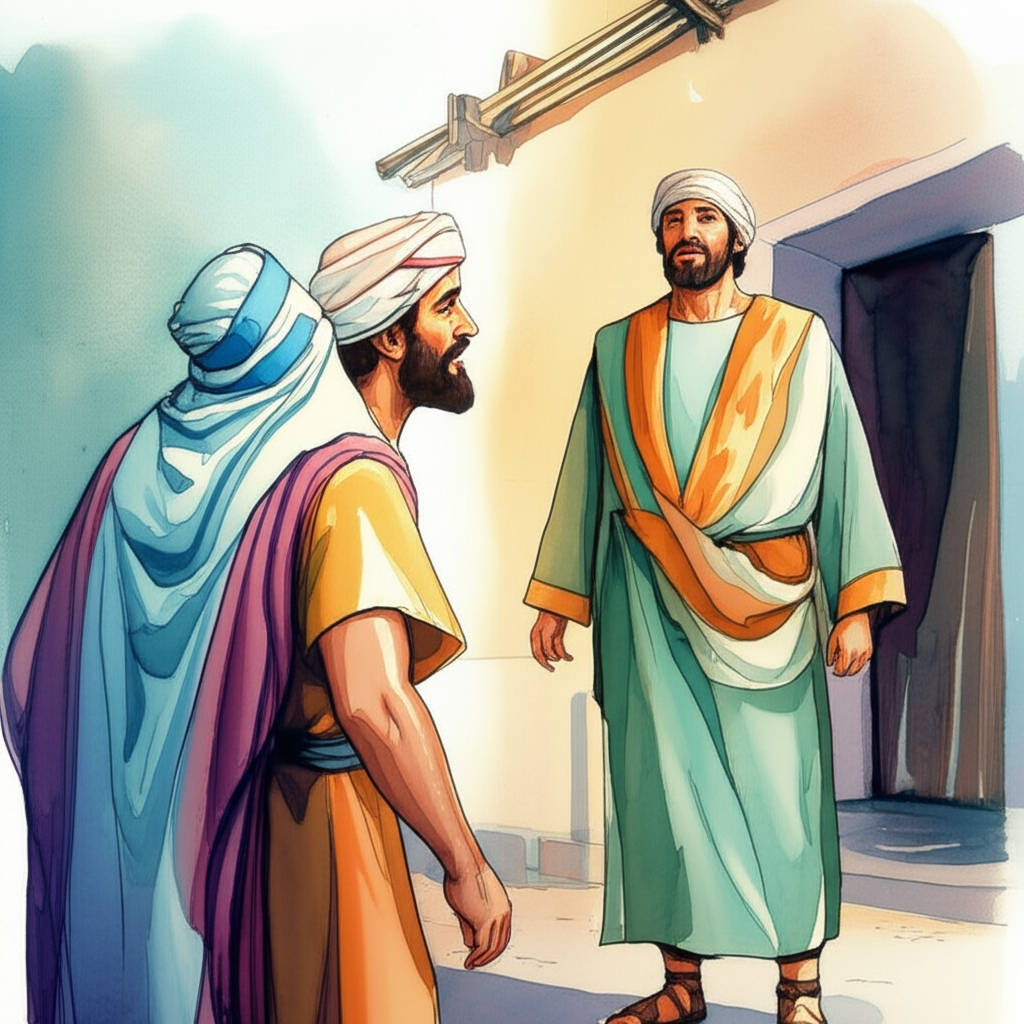
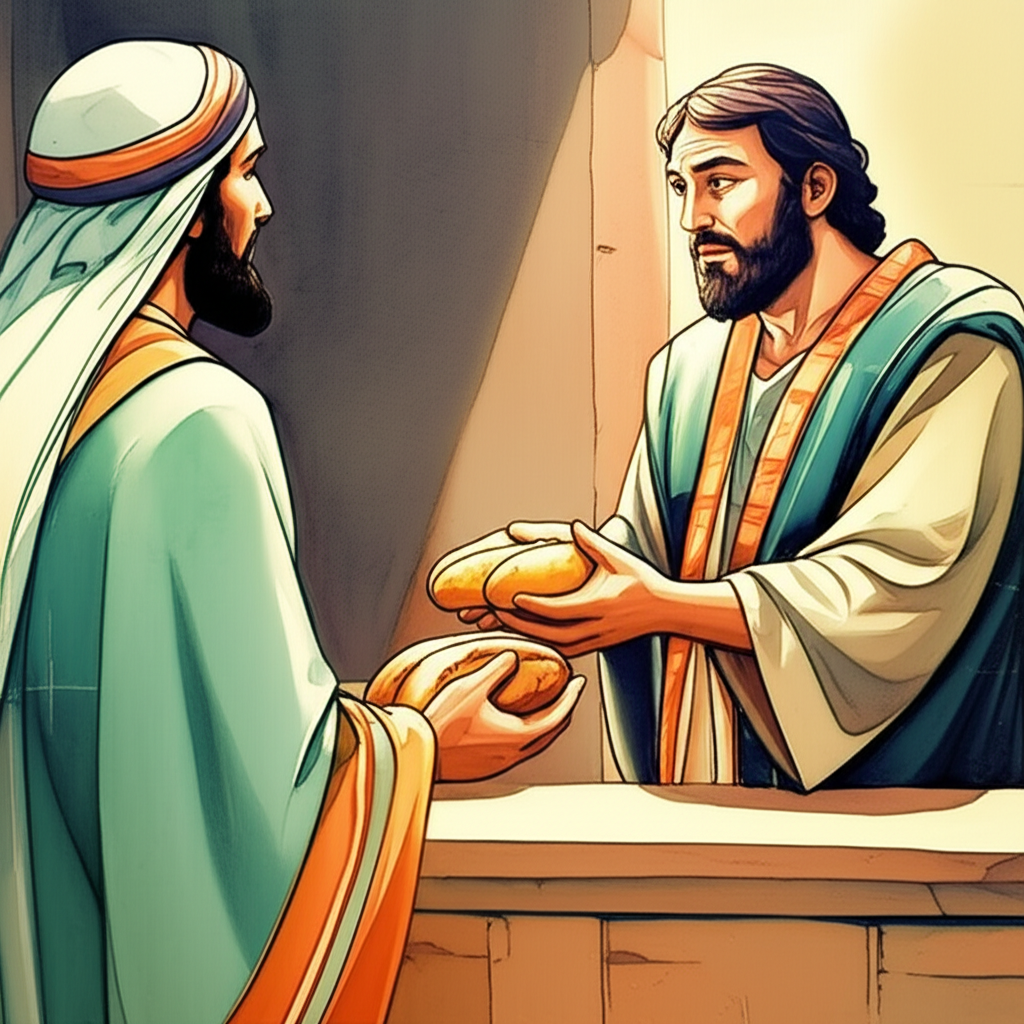
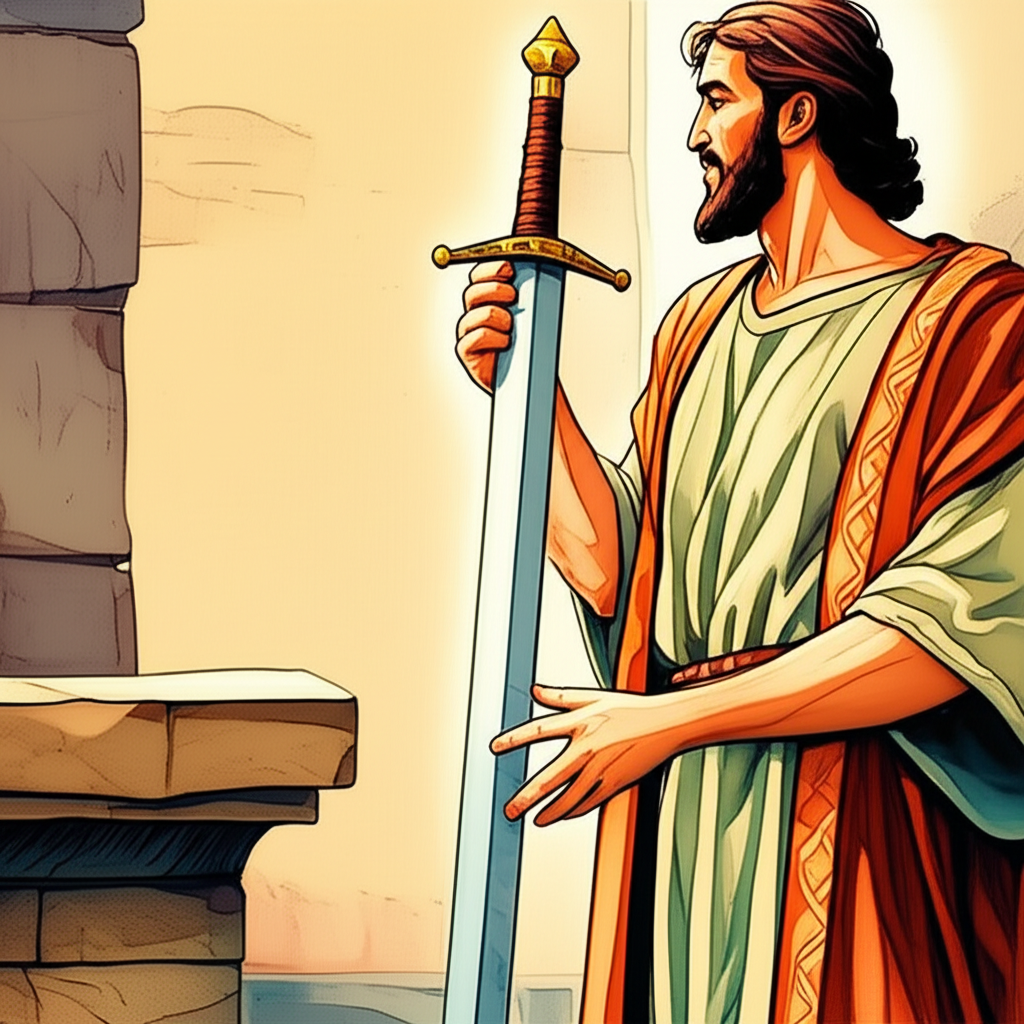
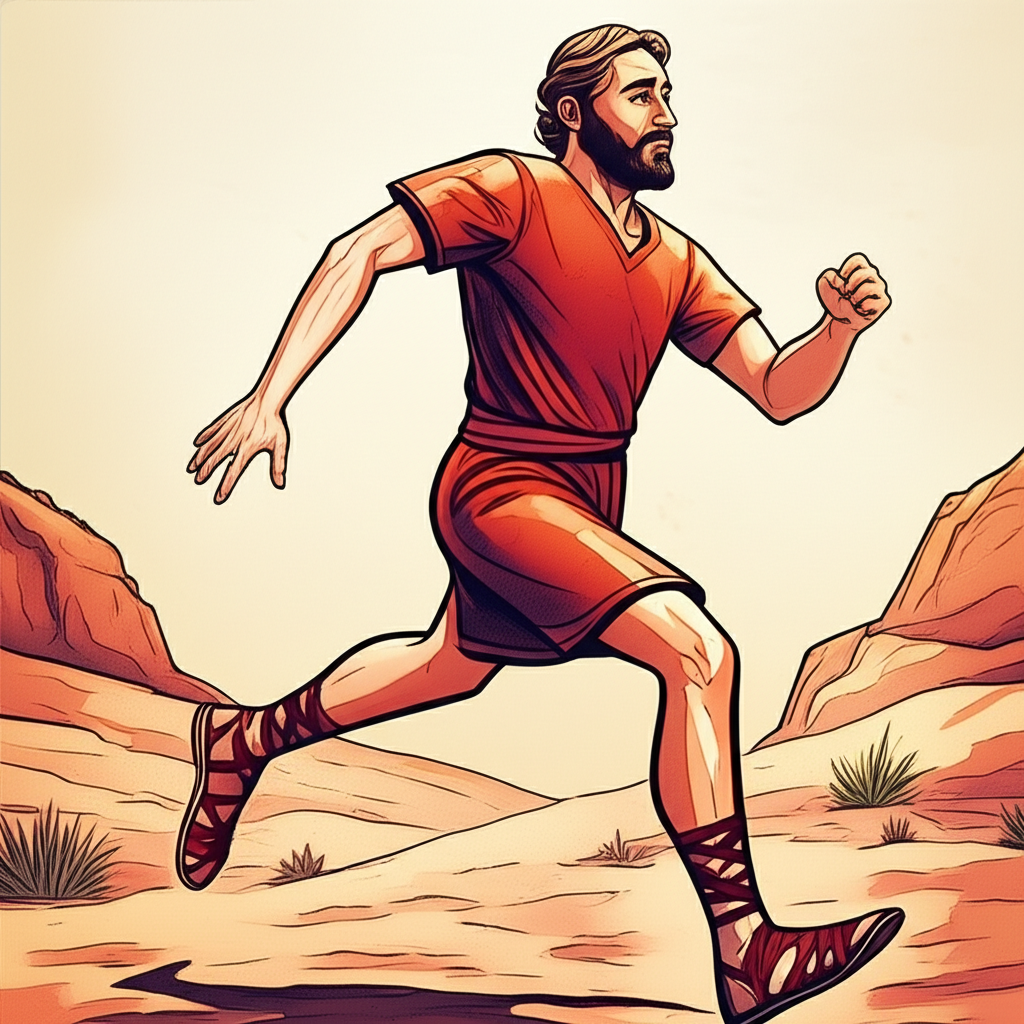
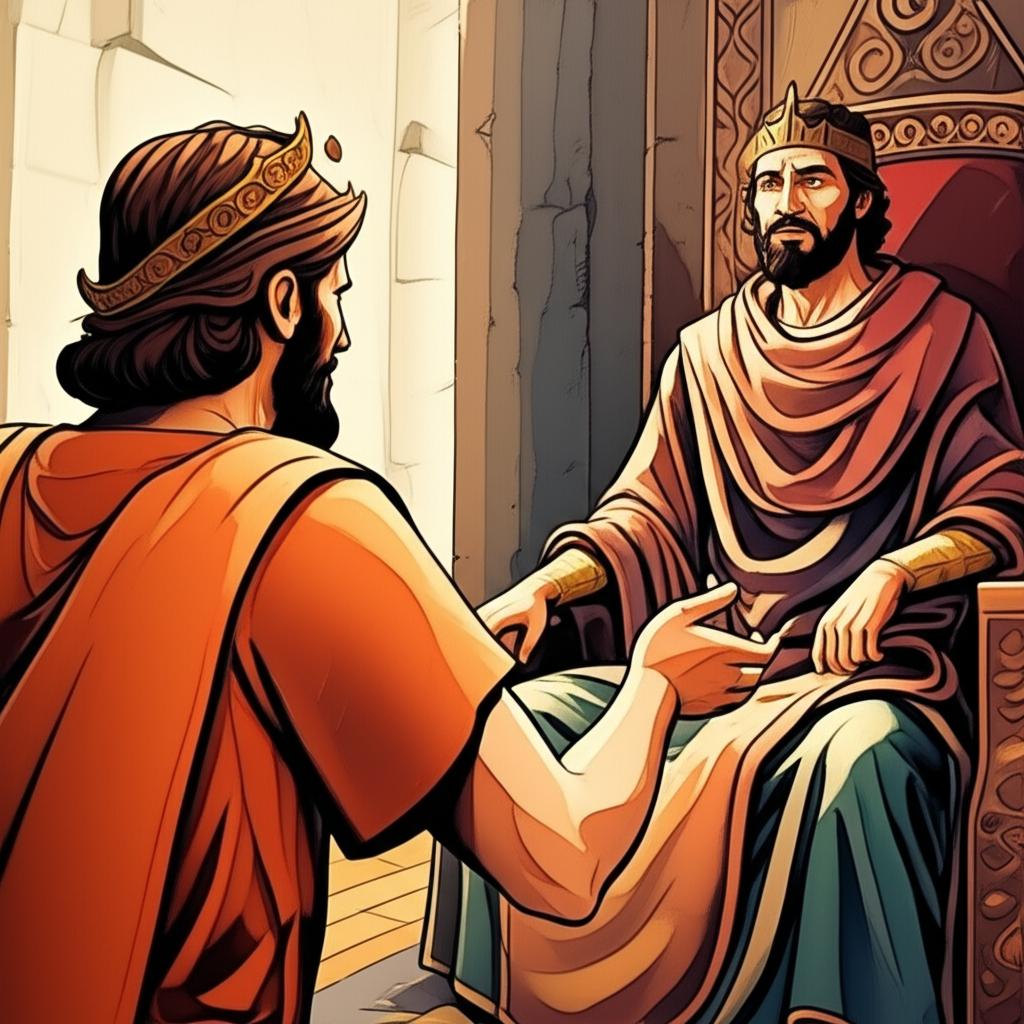
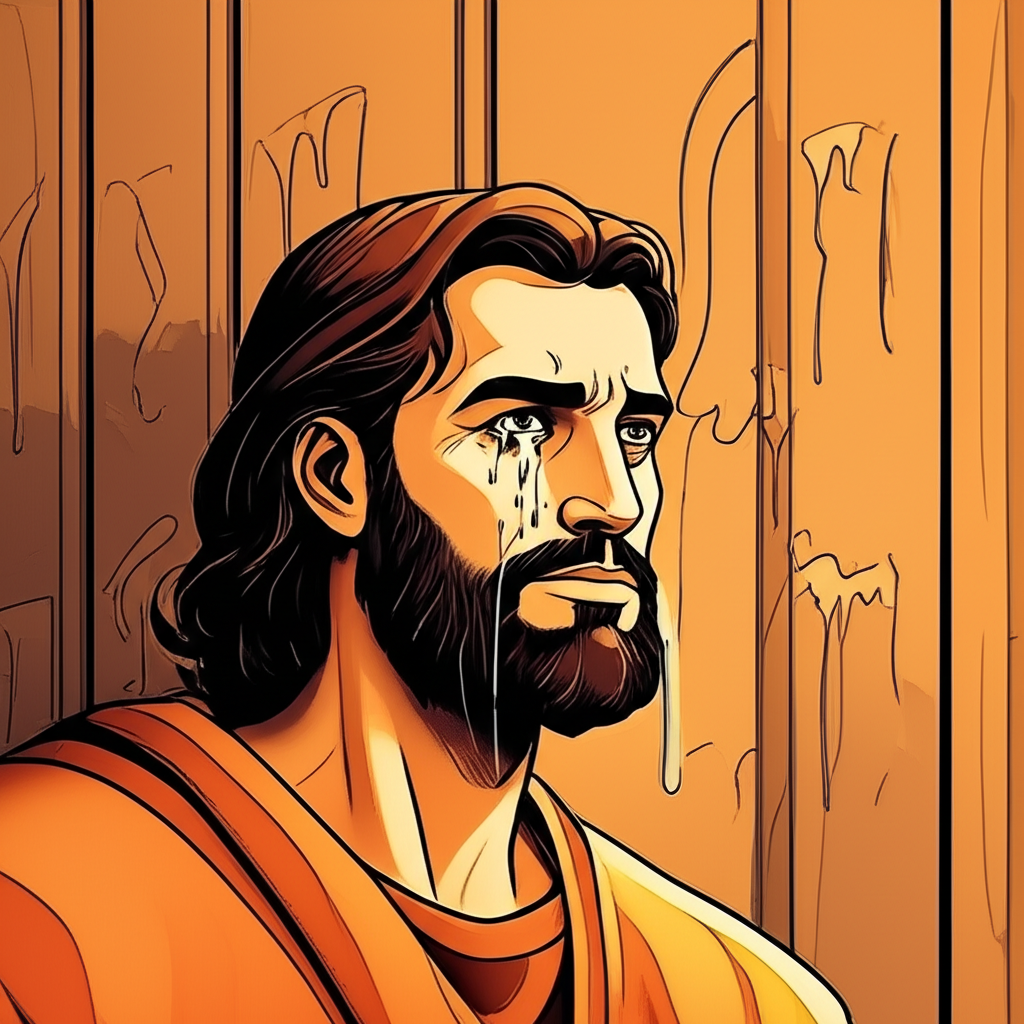
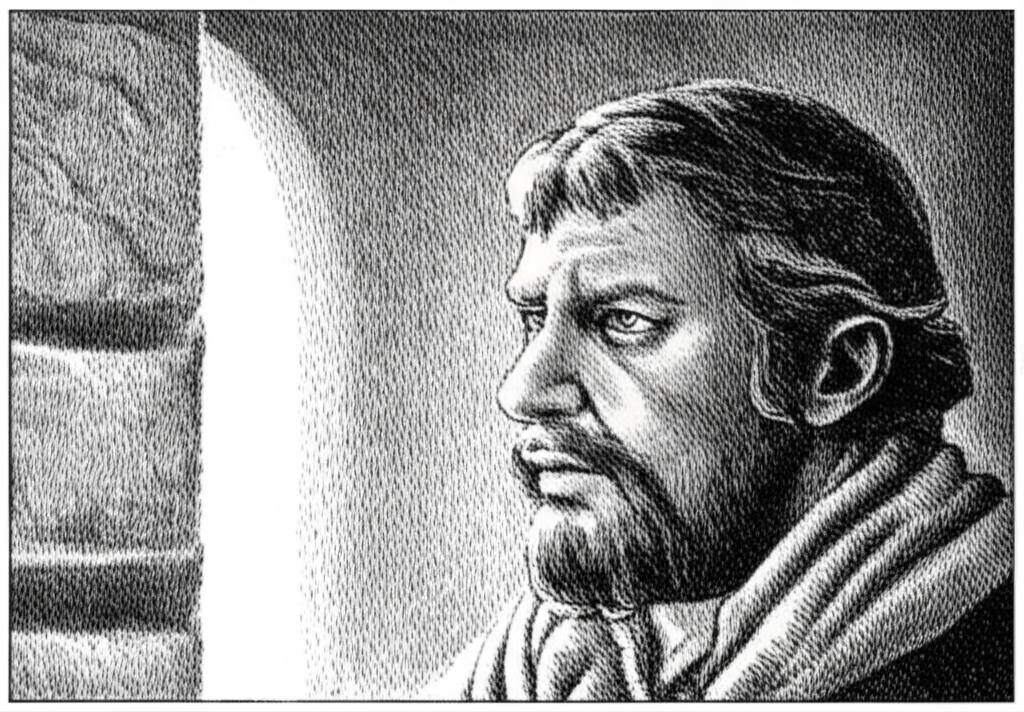


1 Samuel chapter 21 kjv
- 1 Then came David to Nob to Ahimelech the priest: and Ahimelech was afraid at the meeting of David, and said unto him, Why art thou alone, and no man with thee?
- 2 And David said unto Ahimelech the priest, The king hath commanded me a business, and hath said unto me, Let no man know any thing of the business whereabout I send thee, and what I have commanded thee: and I have appointed my servants to such and such a place.
- 3 Now therefore what is under thine hand? give me five loaves of bread in mine hand, or what there is present.
- 4 And the priest answered David, and said, There is no common bread under mine hand, but there is hallowed bread; if the young men have kept themselves at least from women.
- 5 And David answered the priest, and said unto him, Of a truth women have been kept from us about these three days, since I came out, and the vessels of the young men are holy, and the bread is in a manner common, yea, though it were sanctified this day in the vessel.
- 6 So the priest gave him hallowed bread: for there was no bread there but the showbread, that was taken from before the LORD, to put hot bread in the day when it was taken away.
- 7 Now a certain man of the servants of Saul was there that day, detained before the LORD; and his name was Doeg, an Edomite, the chiefest of the herdmen that belonged to Saul.
- 8 And David said unto Ahimelech, And is there not here under thine hand spear or sword? for I have neither brought my sword nor my weapons with me, because the king's business required haste.
- 9 And the priest said, The sword of Goliath the Philistine, whom thou slewest in the valley of Elah, behold, it is here wrapped in a cloth behind the ephod: if thou wilt take that, take it: for there is no other save that here. And David said, There is none like that; give it me.
- 10 And David arose and fled that day for fear of Saul, and went to Achish the king of Gath.
- 11 And the servants of Achish said unto him, Is not this David the king of the land? did they not sing one to another of him in dances, saying, Saul hath slain his thousands, and David his ten thousands?
- 12 And David laid up these words in his heart, and was sore afraid of Achish the king of Gath.
- 13 And he changed his behavior before them, and feigned himself mad in their hands, and scrabbled on the doors of the gate, and let his spittle fall down upon his beard.
- 14 Then said Achish unto his servants, Lo, ye see the man is mad: wherefore then have ye brought him to me?
- 15 Have I need of mad men, that ye have brought this fellow to play the mad man in my presence? shall this fellow come into my house?
1 Samuel chapter 21 nkjv
- 1 Now David came to Nob, to Ahimelech the priest. And Ahimelech was afraid when he met David, and said to him, "Why are you alone, and no one is with you?"
- 2 So David said to Ahimelech the priest, "The king has ordered me on some business, and said to me, 'Do not let anyone know anything about the business on which I send you, or what I have commanded you.' And I have directed my young men to such and such a place.
- 3 Now therefore, what have you on hand? Give me five loaves of bread in my hand, or whatever can be found."
- 4 And the priest answered David and said, "There is no common bread on hand; but there is holy bread, if the young men have at least kept themselves from women."
- 5 Then David answered the priest, and said to him, "Truly, women have been kept from us about three days since I came out. And the vessels of the young men are holy, and the bread is in effect common, even though it was consecrated in the vessel this day."
- 6 So the priest gave him holy bread; for there was no bread there but the showbread which had been taken from before the LORD, in order to put hot bread in its place on the day when it was taken away.
- 7 Now a certain man of the servants of Saul was there that day, detained before the LORD. And his name was Doeg, an Edomite, the chief of the herdsmen who belonged to Saul.
- 8 And David said to Ahimelech, "Is there not here on hand a spear or a sword? For I have brought neither my sword nor my weapons with me, because the king's business required haste."
- 9 So the priest said, "The sword of Goliath the Philistine, whom you killed in the Valley of Elah, there it is, wrapped in a cloth behind the ephod. If you will take that, take it. For there is no other except that one here." And David said, "There is none like it; give it to me."
- 10 Then David arose and fled that day from before Saul, and went to Achish the king of Gath.
- 11 And the servants of Achish said to him, "Is this not David the king of the land? Did they not sing of him to one another in dances, saying: 'Saul has slain his thousands, And David his ten thousands'?"
- 12 Now David took these words to heart, and was very much afraid of Achish the king of Gath.
- 13 So he changed his behavior before them, pretended madness in their hands, scratched on the doors of the gate, and let his saliva fall down on his beard.
- 14 Then Achish said to his servants, "Look, you see the man is insane. Why have you brought him to me?
- 15 Have I need of madmen, that you have brought this fellow to play the madman in my presence? Shall this fellow come into my house?"
1 Samuel chapter 21 niv
- 1 David went to Nob, to Ahimelek the priest. Ahimelek trembled when he met him, and asked, "Why are you alone? Why is no one with you?"
- 2 David answered Ahimelek the priest, "The king sent me on a mission and said to me, 'No one is to know anything about the mission I am sending you on.' As for my men, I have told them to meet me at a certain place.
- 3 Now then, what do you have on hand? Give me five loaves of bread, or whatever you can find."
- 4 But the priest answered David, "I don't have any ordinary bread on hand; however, there is some consecrated bread here?provided the men have kept themselves from women."
- 5 David replied, "Indeed women have been kept from us, as usual whenever I set out. The men's bodies are holy even on missions that are not holy. How much more so today!"
- 6 So the priest gave him the consecrated bread, since there was no bread there except the bread of the Presence that had been removed from before the LORD and replaced by hot bread on the day it was taken away.
- 7 Now one of Saul's servants was there that day, detained before the LORD; he was Doeg the Edomite, Saul's chief shepherd.
- 8 David asked Ahimelek, "Don't you have a spear or a sword here? I haven't brought my sword or any other weapon, because the king's mission was urgent."
- 9 The priest replied, "The sword of Goliath the Philistine, whom you killed in the Valley of Elah, is here; it is wrapped in a cloth behind the ephod. If you want it, take it; there is no sword here but that one." David said, "There is none like it; give it to me."
- 10 That day David fled from Saul and went to Achish king of Gath.
- 11 But the servants of Achish said to him, "Isn't this David, the king of the land? Isn't he the one they sing about in their dances: "?'Saul has slain his thousands, and David his tens of thousands'?"
- 12 David took these words to heart and was very much afraid of Achish king of Gath.
- 13 So he pretended to be insane in their presence; and while he was in their hands he acted like a madman, making marks on the doors of the gate and letting saliva run down his beard.
- 14 Achish said to his servants, "Look at the man! He is insane! Why bring him to me?
- 15 Am I so short of madmen that you have to bring this fellow here to carry on like this in front of me? Must this man come into my house?"
1 Samuel chapter 21 esv
- 1 Then David came to Nob, to Ahimelech the priest. And Ahimelech came to meet David, trembling, and said to him, "Why are you alone, and no one with you?"
- 2 And David said to Ahimelech the priest, "The king has charged me with a matter and said to me, 'Let no one know anything of the matter about which I send you, and with which I have charged you.' I have made an appointment with the young men for such and such a place.
- 3 Now then, what do you have on hand? Give me five loaves of bread, or whatever is here."
- 4 And the priest answered David, "I have no common bread on hand, but there is holy bread ? if the young men have kept themselves from women."
- 5 And David answered the priest, "Truly women have been kept from us as always when I go on an expedition. The vessels of the young men are holy even when it is an ordinary journey. How much more today will their vessels be holy?"
- 6 So the priest gave him the holy bread, for there was no bread there but the bread of the Presence, which is removed from before the LORD, to be replaced by hot bread on the day it is taken away.
- 7 Now a certain man of the servants of Saul was there that day, detained before the LORD. His name was Doeg the Edomite, the chief of Saul's herdsmen.
- 8 Then David said to Ahimelech, "Then have you not here a spear or a sword at hand? For I have brought neither my sword nor my weapons with me, because the king's business required haste."
- 9 And the priest said, "The sword of Goliath the Philistine, whom you struck down in the Valley of Elah, behold, it is here wrapped in a cloth behind the ephod. If you will take that, take it, for there is none but that here." And David said, "There is none like that; give it to me."
- 10 And David rose and fled that day from Saul and went to Achish the king of Gath.
- 11 And the servants of Achish said to him, "Is not this David the king of the land? Did they not sing to one another of him in dances, 'Saul has struck down his thousands, and David his ten thousands'?"
- 12 And David took these words to heart and was much afraid of Achish the king of Gath.
- 13 So he changed his behavior before them and pretended to be insane in their hands and made marks on the doors of the gate and let his spittle run down his beard.
- 14 Then Achish said to his servants, "Behold, you see the man is mad. Why then have you brought him to me?
- 15 Do I lack madmen, that you have brought this fellow to behave as a madman in my presence? Shall this fellow come into my house?"
1 Samuel chapter 21 nlt
- 1 David went to the town of Nob to see Ahimelech the priest. Ahimelech trembled when he saw him. "Why are you alone?" he asked. "Why is no one with you?"
- 2 "The king has sent me on a private matter," David said. "He told me not to tell anyone why I am here. I have told my men where to meet me later.
- 3 Now, what is there to eat? Give me five loaves of bread or anything else you have."
- 4 "We don't have any regular bread," the priest replied. "But there is the holy bread, which you can have if your young men have not slept with any women recently."
- 5 "Don't worry," David replied. "I never allow my men to be with women when we are on a campaign. And since they stay clean even on ordinary trips, how much more on this one!"
- 6 Since there was no other food available, the priest gave him the holy bread ? the Bread of the Presence that was placed before the LORD in the Tabernacle. It had just been replaced that day with fresh bread.
- 7 Now Doeg the Edomite, Saul's chief herdsman, was there that day, having been detained before the LORD.
- 8 David asked Ahimelech, "Do you have a spear or sword? The king's business was so urgent that I didn't even have time to grab a weapon!"
- 9 "I only have the sword of Goliath the Philistine, whom you killed in the valley of Elah," the priest replied. "It is wrapped in a cloth behind the ephod. Take that if you want it, for there is nothing else here." "There is nothing like it!" David replied. "Give it to me!"
- 10 So David escaped from Saul and went to King Achish of Gath.
- 11 But the officers of Achish were unhappy about his being there. "Isn't this David, the king of the land?" they asked. "Isn't he the one the people honor with dances, singing, 'Saul has killed his thousands,
and David his ten thousands'?" - 12 David heard these comments and was very afraid of what King Achish of Gath might do to him.
- 13 So he pretended to be insane, scratching on doors and drooling down his beard.
- 14 Finally, King Achish said to his men, "Must you bring me a madman?
- 15 We already have enough of them around here! Why should I let someone like this be my guest?"
- Bible Book of 1 Samuel
- 1 Story of Hannah
- 2 Hannah's song and Prayer
- 3 Story of Samuel
- 4 The Philistines Capture the Ark
- 5 The Philistines and the Ark
- 6 The Ark Returned to Israel
- 7 Samuel Judges Israel
- 8 Israel Asks for a King
- 9 Saul the first king of Israel
- 10 Samuel Anoints Saul as King
- 11 Saul Defeats the Ammonites
- 12 Samuel's Farewell Address
- 13 Saul Fights the Philistines
- 14 Story of Jonathan
- 15 Saul and the Amalekites
- 16 David annointed
- 17 David and Goliath story
- 18 David and Jonathan's Friendship
- 19 Saul Tries to Kill David
- 20 Jonathan Warns David
- 21 David and the Holy Bread
- 22 David in the cav of Adullam
- 23 David Saves the City of Keilah
- 24 David Spares Saul's Life
- 25 Death of Samuel and Abigail
- 26 David Spares Saul Again
- 27 David Flees to the Philistines
- 28 Saul consults the Witch of Endor
- 29 The Philistines Reject David
- 30 David's Wives Are Captured
- 31 Death of Saul